Many people dream of having a pool right in their backyard. It’s a place for splashing, playing, and relaxing on hot days.
They bring the joy of a pool without taking up too much space, and they can also add value to your home.
That depends on a few things. Where you live, for one. And what your neighbors have in their yards.
So, if you think a built-in pool is a good idea, you should go for it.
Let’s find the facts and help you decide if it’s the right investment for you and your family.

1. Types of Pools
When considering a pool, the first decision is whether to go for an in-ground or above-ground pool.
In-ground pools are built into the ground, often made of materials like concrete, vinyl, or fiberglass.
They offer a clean and attractive appearance but can be more expensive to install and maintain.
Above-ground pools, on the other hand, are above ground and typically have steel or polymer walls.
They are generally easier and quicker to install and come at a lower initial cost.
2. Putting in a Pool
Installing a pool can be a significant investment.
It’s essential to evaluate if it’s a worthwhile addition to your home.
Factors like your location, climate, and how often you’ll use the pool should be considered.
A pool is more practical in warmer climates and areas with longer swimming seasons.
3. How Much Does a Pool Cost
The cost of a pool involves both installation and maintenance expenses.
The average price for installing a pool is around $40,000, depending on factors like type and size.
Maintenance costs can range from $700 to $5,000 annually, covering items like cleaning, chemical treatments, and repairs.
You should use a pool cover to protect your pool from leaves and dirt when it’s not in use.
4. Adding Value to Your Home
A pool can improve the value of your home, but the increase may vary. In certain circumstances, it may boost your home’s value by up to 7%.
Factors like location and neighborhood norms play a crucial role.
However, it’s important to remember that a pool that dominates the entire backyard might not appeal to all potential buyers.
5. What Affects Pool Costs
Various factors influence pool costs, such as the type of pool, materials used, size, and additional features like covers, diving boards, and enclosures, all contribute to the overall expense.
6. Pros of Having a Pool
Pools offer a source of enjoyment and relaxation.
They provide a space for entertaining friends and family, and they can be used for exercise and recreation.
Having a pool at home saves you the hassle of traveling to a public pool.
You should use pool test strips to help you check the water quality of your pool.
7. ROI Considerations
The return on Investment (ROI) from a pool depends on factors such as your location, the neighborhood’s pool trends, and the climate.
In warmer regions with a pool-friendly culture, the ROI is likely to be higher.
8. Cons of Having a Pool
Alongside the initial investment, ongoing costs and seasonal use are important considerations.
Pools require regular maintenance, and in colder climates, they may not be usable for extended periods.
9. Keeping Your Pool in Good Shape
Proper maintenance is crucial for a pool’s longevity.
This includes regular cleaning, vacuuming, chemical treatments, and equipment checks.
Neglecting maintenance can lead to costly repairs.
10. Is a Pool a Smart Investment?
Deciding on a pool involves careful consideration.
It’s important to weigh the costs against the benefits and assess how much use you’ll get from it.
11. Good and Not-So-Good of Having a Pool
While a pool offers numerous advantages, it’s important to acknowledge potential downsides.
These may include limited use in colder climates, higher insurance costs, and safety concerns.
Use a pool skimmer net to keep your pool clean by removing debris like leaves and bugs.
12. How Pools Impact Home Value
The impact of a pool on home value varies based on location.
In warmer states and pool-friendly neighborhoods, it can significantly enhance property value.
13. Sizing Guidelines
The pool size should be determined by factors like the available space in your backyard and the number of people who will use it.
Smaller pools can still provide ample enjoyment.
The pool size should be determined by factors like the available space in your backyard and the number of people who will use it.
Smaller pools can still provide ample enjoyment and are perfect for those looking for small backyard pool ideas.
14. Depth and Size
Recommendations for pool depth and size are based on household size.
Larger households may benefit from bigger pools, while smaller families might find smaller pools more suitable.
Conclusion
Having a built-in pool can be a nice thing for many people.
It can bring joy and fun times with family and friends.
But it’s important to think about it carefully.
Pools need money to set up and maintain.
Having a pool can make your home worth more, but not always much more.
It depends on where you live and what others around you have.
Too big a pool might not be good, as it could take up too much space.
And, if you ever sell your home, some people might not want a pool.
But if you’re unsure, it’s okay to think more about it.
Remember, a pool is a big choice, so choose wisely.


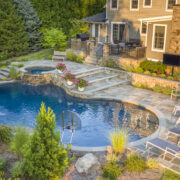
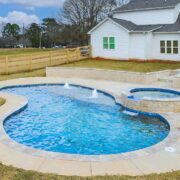
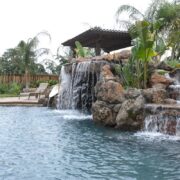

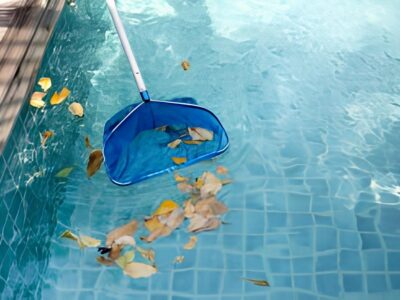
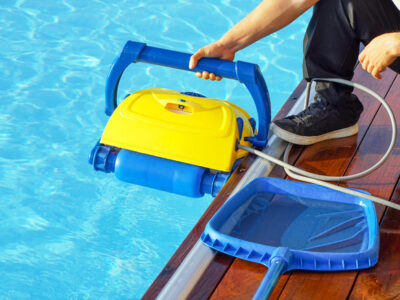




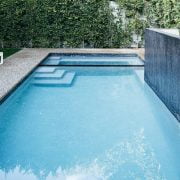
Comments